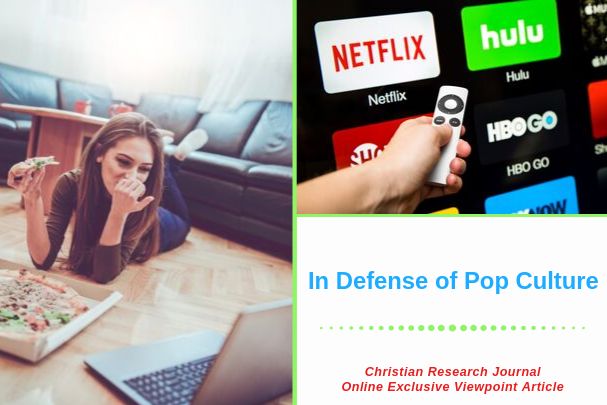This is an exclusive-online feature article viewpoint from the Christian Research Journal. For further information or to subscribe to the Christian Research Journal please click here.
Viewpoint articles address relevant contemporary issues in discernment and apologetics from a particular perspective that is usually not shared by all Christians, with the intended result that Christians’ thinking on that issue will be stimulated and enhanced (whether or not people end up agreeing with the author’s opinion).
When you to subscribe to the Journal ,you join the team of print subscribers whose paid subscriptions help provide the resources at equip.org that minister to people worldwide. These resources include our free online-exclusive articles, such as this review, as well as our free Postmodern Realities podcast.
Another way you can support keeping our resources free is by leaving us a tip. A tip is just a small amount, like $3 or $5, which is the cost for some of a latte, lunch out, or coffee drink. To leave a tip, click here.
Binge, noun, “a period of excessive or uncontrolled indulgence.”
This summer I enjoyed watching season three of hit Netflix show Stranger Things. It was lots of fun — scares, humor and plenty of endearingly nerdy characters. However, although I finished only 11 days after it was released, I already felt something of a latecomer. Almost from the moment of its release, I was having to dodge spoiler-filled analysis and discussions online. And it turns out the show broke records with 18 million viewers watching the seven-hour plus series within the first four days. Binge watching is the norm in the Netflix age.
At the same time, several Christian voices have recently been questioning the value of engaging with pop culture, and particularly the kind of entertainment gluttony encouraged by the convenience of services like Netflix. In an article, “Against Pop Culture,” for the website Mere Orthodoxy, Brad East argues:
Reading, cooking, gardening, playing a board game, building something with your hands, chatting with a neighbor, grabbing coffee with a friend, serving in a food pantry, learning a language, cleaning, sleeping, journaling, praying, sitting on your porch, resting, catching up with your spouse or housemate: every one of these things would be a qualitative improvement on streaming a show or movie (much less scrolling infinitely on Instagram or Twitter).
There is no argument for spending time online or “engaging” pop culture as a better activity for Christians with time on their hands than these or other activities. Netflix is always worse for your soul — and your mind, and your heart, and your body — than the alternative.1
In a follow-up post, East summarized his argument as being “that Christians (with an audience) who believe or write that Christians (in general) ought to ‘engage’ popular culture as an imperative are wrong.”2
So are those of us who believe that engaging popular culture is valuable mistaken? Are we distracting ourselves from both more spiritually important things and from forms of rest and recreation that are qualitatively better? In the age of binge watching, how shall we then stream? Should we even stream?
East’s critique also resonates with me because of my current stage of life: now I’m a father of two small children, I have much less free time available, and so prioritization is much more of a necessity. Back in my twenties, I could play video games, watch television and movies, post on social media, and still have time left over for books and for real-life friendships. Now I have to choose, and with that comes the reflection that perhaps I should have chosen more wisely sooner. What could I have done with all the time I used to have if I’d spent less on pop culture?
But while I agree that there’s a real danger of excessive consumption of pop culture, I want to defend the notion of “engaging with pop culture.” Enjoying and discussing pop culture reflectively and in moderation is part of the solution to binge-watching culture, not a symptom of the problem. There may be specific issues around streaming media that we need to be alert and attentive to, but that requires a more targeted critique than simply pop cultural engagement in general.
A key issue is what “engaging with pop culture” exactly means. Let’s start with “pop culture.” It’s curious that East’s list of better alternatives to Netflix include other forms of popular culture, including reading and board games. His primary objection seems to be against streaming and social media. There may well be good reasons to be wary of these particular forms of popular culture, without dismissing pop culture in general. There’s a difference between the merits of movies or TV shows, considered individually, from the all-you-can-eat, bottomless buffets that Netflix, Amazon Prime, YouTube, Hulu — and soon Disney+ and Apple TV+ — provide. Netflix, in particular, encourages binge watching by dropping whole seasons at once, and defaulting to auto-playing the next episode or clip (I’d highly recommend turning this option off in all your streaming apps). Television has always leant itself more easily than other forms of culture to passive consumption. But streaming takes it to new extremes with algorithmic tailoring of endless content to our individual tastes. These concerns don’t speak directly to the value of pop culture in general, however.
Why is pop culture valuable? I believe it is valuable because culture is one of the ways in which we image God. It has the potential to reflect the creativity of God, and to express goodness, truth, and beauty, while grappling with the challenges of a broken, sinful world. As Joe Rigney helpfully puts it in The Things of Earth:
To return to where this book began, culture making is one of the primary ways that God invites us to participate in his triune fullness. In cultivating creation, subduing the earth, and faithfully naming God’s world (in all its varied forms), we are fulfilling the cultural mandate and participating in God’s mission to fill the world with his glory.3
Culture is also a key way in which we express human relationality. Stories connect us, both with the creators of those artifacts, and with others engaging with the same thing. Now I would agree with concerns that it’s not healthy for pop culture to be the only or main thing that connects us or that we are able to talk about. But it also gives us a way of understanding different viewpoints, of entering into other people’s experiences. As I argued elsewhere, consuming pop culture is a way of loving our neighbors by listening to their stories. Those stories reflect and shape the way they think and feel, and attentive listening helps us to understand better the people around us. This isn’t simply instrumentalization of stories to other ends, but an inherent feature of how stories function for us as human beings.
Of course, we humans are fallen creatures. Sin infects all we do, from movies to pop albums, operas to comic strips. While culture making is in principle good, many particular cultural artifacts aren’t good, falling short artistically and morally. Cultural artifacts, to varying degrees, shape our hearts away from loving God’s ways, and must be handled with care or, in some cases, avoided altogether. We can’t “engage” culture from some height that leaves us unaffected. We also need to be alert to the different impacts of different mediums and context, such as the difference between going to the cinema to watch a film with a group of friends, and half-watching that same film on Netflix while we scroll through social media. Not all pop culture is equally worth our time. The value of engaging with a given show or book or album or whatever depends on a number of things: its inherent artistic value; its effect in orienting our hearts toward or away from the good; the currency it has within the people we have relationships with; and what other, possibly better, options are open to us with our limited time. That is a matter for wisdom, but it isn’t mere high-minded justification to suggest that for many Christians, pop culture is worthwhile as a cultural good and a point of connection with others.
If these debates need to be more specific in defining “pop culture,” then what of “engagement”? East identifies “finding the gospel in [pop culture artifact X]” as “a ubiquitous and representative genre.” It’s easy to mock the tendency among some Christians to creatively interpret their favorite pieces of pop culture to find contrived connections and gospel illustrations. And yet our culture is still so haunted by the memory of the gospel that genuine echoes can often really be found. Further, the better kind of Christian cultural analysis doesn’t treat pop culture as a quarry for useful sermon illustrations but seeks to genuinely understand the worldviews of different artists and creators on their own terms, and dialogue with it from a Christian perspective.4 It is a form of the “double listening” that John Stott argued that Christians are called to, where we listen to both “the Word with humble reverence…[and] to the world with critical alertness.”5 Pop culture is far from the only form of double listening, but it is a significant one.
In my experience, I have found that some of the most constructive gospel conversations I have had with non-believers have come through the discussion of pop culture. In many contexts, people’s defenses against talking religion are up, with politics and culture wars throwing up many barriers to meaningful engagement. But when, for example, the television series Doctor Who has drawn on biblical themes and images, it has given me several good opportunities to explain the allusions, and to offer my spin on how if fellow fans like the self-sacrificial, non-violent heroism of the Doctor, then the reality of Christ that he is echoing is even more enjoyable and meaningful. I have found people to be much more open to those kind of connections and comparisons than more directly religious conversations.
Engaging with pop culture is also an important front in various cultural debates and battles. For example, the current push to normalize transgender identities is being fought on our TV screens. In 2014, Laverne Cox became the first transgendered actor to be nominated for an Emmy award, for her role in Orange is the New Black (Netflix). Issue-led dramas such as Butterfly on British channel ITV about a transgender 11-year-old seek to increase acceptance. Pop culture is uniquely powerful to change attitudes because of its wide reach and use of story and emotion. Often these dramas personalize issues in a way that has a greater impact than careful argument or evidence. While it certainly wouldn’t be wise for every Christian to engage directly with these kind of stories, Christians need to be alert to the personal narratives and emotional appeals that are driving cultural changes far more forcefully than any legislative battles.
There is a danger with the idea of “cultural engagement” being merely reactive to culture — merely reviewing or responding or criticizing. It’s better to thoughtfully respond than to passively consume pop culture. But better yet is getting stuck in and engaging culture by creating culture. Instead of putting out another blog or review or think piece, why not write a novel, compose a song, script a play, invent a game or make a painting? Do something new; tell stories that reveal the world as seen through eyes shaped by the gospel, with as much goodness, truth, and beauty as you can muster.
Let’s bring it back to Netflix. If pop culture and cultural engagement are in principle good, how should we then stream? The principle that “everything is permissible, but not everything is beneficial” (1 Cor. 10:23) is an important one here. There is potential good, but how does it weigh up against other available goods? What is the opportunity cost in terms of energy, relationships, participation in real-life social interactions?
One way to count the cost more readily would be to ditch the bottomless streaming services, and pay as you go for the particular shows and movies you really want to watch; psychologically, paying for individual items might help. I even think that in an era of entertainment gluttony, asceticism in the arena of media consumption can be a good and valid response for Christians. Abstaining from TV could be a witness to the world that there is more to life than entertainment, and free us up for more meaningful forms of connection with others and engagement with culture more broadly.
But I also affirm that grateful, reflective engagement with pop culture has genuine value for many Christians within Western culture. Cheerful moderation can challenge media addiction, just as much as complete abstention. Perhaps it’s enough to gain an appreciation of the value and potential of each moment. I suspect that when all is said and done, and all qualifications put in place, East’s concerns about and my affirmations of pop culture end up not so far apart.
If we remember the creativity that we can exercise when we give it the time to flourish, then mere passive consumption seems less appealing. If we appreciate activities that bring us into direct contact with other human beings, from meals shared, to conversations, to games, then perhaps we will spend more time on those than sitting in silence together in front of screens. If we remember that we live in a world full of great needs and great opportunities to make a difference, then perhaps we will do more to step up and step out to do good to our communities and societies.
And perhaps in the course of a fuller, more meaningful week, we might choose to kick back with an hour or two of entertainment just for fun, actively choosing something really good to watch as a treat, rather than passively sliding into watching whatever as a stale habit.
If the unexamined life is not worth living, then how much more is the unexamined Netflix queue not worth watching. Let’s consider our habits wisely. —Caleb Woodbridge
Caleb Woodbridge loves stories in many forms, including in games, movies, comics and television, but in books most of all. He lives in Bletchley, England, and works as Publishing Director for InterVarsity Press UK.
NOTES
- Brad East, “Against Pop Culture,” Mere Orthodoxy, July 9, 2019, https://mereorthodoxy.com/against-pop-culture/.
- Brad East, “Pop Culture, For and Against,” Resident Theologian, July 10, 2019, https://resident-theologian.blogspot.com/2019/07/pop-culture-for-and-against.html.
- Joe Rigney, The Things of Earth (Carol Stream, IL: Crossway, 2015), 147.
- Robert Velarde, “Television as the New Literature: Understanding and Evaluating the Medium,” Christian Research Journal 33, no. 04, https://www.equip.org/article/television-as-the-new-literature-understanding-and-evaluating-the-medium/.
- John Stott, The Contemporary Christian, (InterVarsity Press, 1992), 28.









